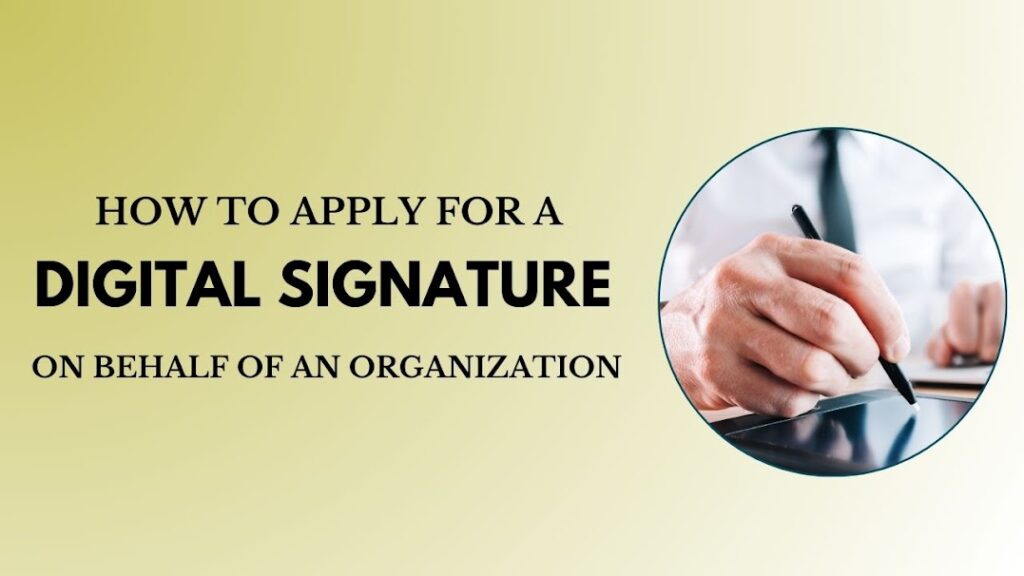
In today’s digital world, businesses and organizations are moving their operations online. Documents, contracts, applications, and other official tasks are now done through digital platforms. To ensure security, authenticity, and legal acceptance of these online processes, organizations need digital signatures.
A digital signature is a secure electronic way to sign documents and prove the identity of the person or entity signing. It is especially important for organizations dealing with e-filing, e-tenders, government portals, contracts, and confidential business documents.
What Is a Digital Signature Certificate (DSC)?
A Digital Signature Certificate (DSC) is an electronic form of a signature that proves the identity of a person or an organization in online transactions. It is issued by a government-approved Certifying Authority (CA) and is used to:
- Sign electronic documents
- Submit applications and forms online
- Participate in e-tendering or e-procurement
- Authenticate identity in secure systems
A DSC ensures:
- Confidentiality of documents
- Integrity (no data tampering)
- Authentication (identity confirmation)
- Legal recognition in most countries
Why Organizations Need Digital Signatures
Organizations often need digital signatures for several purposes:
- Signing documents, invoices, and contracts
- Filing tax returns or compliance forms
- Applying for government tenders and contracts
- Signing board resolutions and minutes
- Ensuring secure internal communications
- Participating in digital government platforms
Only authorized individuals, such as directors, managers, or company secretaries, can apply for and use the DSC on behalf of the organization.
Types of Digital Signature Certificates
Before applying, it is important to know the types of DSCs available:
Class 1:
- Verifies the name and email ID of the individual
- Not used for organizations
Class 2:
- Used for business transactions
- Verifies identity against government databases
- Suitable for company filings, GST, income tax
Class 3:
- Highest level of security
- Required for e-tendering, e-auctions
- Used by organizations for secure transactions
Types of Users in an Organization
When applying for a DSC on behalf of an organization, there are two key roles:
1. Authorized Signatory
This is a person within the organization who is officially allowed to sign documents. Examples include:
- Director
- Partner
- Proprietor
- Company Secretary
- CEO or Manager
The authorized signatory is the one who will receive and use the digital signature.
2. Applicant/Representative
Sometimes, an assistant, administrative officer, or service provider applies for the DSC on behalf of the signatory. But the actual certificate is issued in the name of the authorized signatory.
Documents Required to Apply for Organizational DSC
The documents needed may vary slightly by country or certifying authority, but the common requirements include:
A. Identity and Address Proof of the Authorized Signatory
- Passport
- Voter ID
- Aadhaar Card (in India)
- Driving License
- PAN Card (in India)
- Government-issued ID
B. Authorization Letter from the Organization
- Signed on company letterhead
- Stating the name and role of the authorized signatory
- Granting permission to apply for DSC
C. Organization Proof
- Certificate of Incorporation (for companies)
- Partnership deed (for partnerships)
- Business registration certificate
- PAN of the organization (in India)
- GST certificate
D. Passport-size Photograph
A recent photo of the person applying must be submitted.
E. Application Form
- Filled and signed as per the Certifying Authority’s format
- May include declarations and compliance agreements
Using Your Digital Signature
Once you have received the DSC, you can use it for:
- Signing PDF files
- Filing income tax returns
- Submitting GST forms
- Participating in e-tenders
- Registering or modifying company details
- Signing business contracts electronically
Renewing a Digital Signature Certificate
Digital signatures expire after 1, 2, or 3 years based on the plan you chose. You need to renew before the expiry date to avoid interruptions.
Renewal Process:
- Log in to the CA’s website
- Choose “Renew DSC”
- Update or confirm details
- Upload ID proof if required
- Pay the renewal fee
- Re-download or receive the renewed token
Benefits of Digital Signatures for Organizations
- Legal Validity: DSCs are legally recognized in most countries and are accepted in courts and government departments.
- Time-Saving: No need to print, sign, and scan documents manually. Everything is done online.
- Cost-Effective: Reduces paper, courier, and storage costs.
- Environmentally Friendly: Reduces paper usage and supports digital transformation.
- High Security: Prevents unauthorized access, forgery, or manipulation of documents.
- Easy Compliance: Required for statutory filings like company registration, e-invoicing, tax returns, and government tendering.
Suggested read- What is E-Mudra
Conclusion
Applying for a digital signature on behalf of an organization is now simpler and faster than ever. With the right documents and steps, you can complete the application process in a few days and start using the signature for secure, legal, and convenient online operations.
Whether you’re a startup, a large business, or a government agency, digital signatures help save time, reduce paperwork, and increase security.




